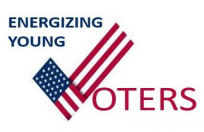Energizing Young Voters – Civics Education in Action
Energizing Young Voters –– Civics Education in Action
Voter Engagement Programing offered under the auspices of the League of Women Voters of Southern Monmouth County
Vision – Every 18-29 year old in the United States will become a life-long voter.
They will understand why it is important to vote, what the current turnout rate is among their age, ethnic, and education level cohorts, and develop the intention to vote. They will be equipped to overcome all barriers to casting a ballot. Back in 2018, visionary volunteers from the League of Women Voters of Southern Monmouth County initiated a pilot program to increase voter registration and turnout among young people (18-29). Called Fighting for The Vote (FFtV), this 3-part interactive classroom course advances the League’s core mission to defend democracy and empower voters and is the centerpiece of Energizing Young Voters, their highimpact voter engagement programming.
Until interrupted by Covid-19 school closures, trained League volunteers presented FFtV at 12 high schools and colleges reaching approximately 500 students, age 14 to 20, largely in underrepresented communities where voter turnout is consistently low. These students have added challenges:
- fewer role-models for voting and civic involvement;
- barriers getting to the polls (work schedules, transportation, etc.);
- a higher mobility rate requiring updates to registration information.
Based on recent scholarship about why the young don’t vote and incorporates the insights of seasoned educators, FFtV includes an interactive exercise where students role-play and offer “excuses” for not voting as well as encouraging, respectful counter-arguments. The program design invites students to join the FFtV team and be trained to present segments of the program to their peers alongside League volunteers. In addition to reinforcing the students’ sense of empowerment, this increased level of involvement has the added benefit of including presenters who look (in age and ethnicity) like the young people who are the target audience.
Undaunted by the lack of opportunity to work directly with students, the nimble program developers focused on different ways to fulfill their mandate. Offerings under the umbrella of Energizing Young Voters now include:
- Fighting for the Vote – classroom lesson on the history of voting rights and
voting trends (3 modules, in person and/or remote)
(http://www.lwvto.org/lwv-initiatives.php) - Voting Simulation Experience – real life simulation from registering to vote, to
reading a sample ballot, to going to the polls, to pulling the lever or filling out
a provisional ballot - Voting in the Time of Covid – how to vote by mail
- Student Advocate Toolkit – how young people can help those in their
households register and vote - #MyVoiceMyVoteNJ – voter registration events in person and remotely
- Dedicated text number for information and reminders
- Vote by Design (with permission: Stanford U.)








